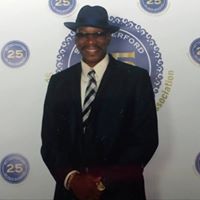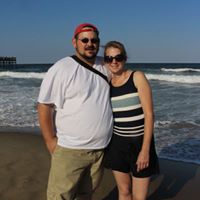Gregory O Payne
age ~48
from Bowie, MD
- Also known as:
-
- Gregory Omar Payne
- Gregory D Payne
- Greg Payne
- Gregory Opayne
- Gregory O'Payne
- Greg Opayne
Gregory Payne Phones & Addresses
- Bowie, MD
- 406 Quiet Hollow Ct APT H, Glen Burnie, MD 21061
- 8221 Averill Ct, Severn, MD 21144
- Reston, VA
- Brooklyn, NY
- Triangle, VA
- 2155 Astoria Cir, Herndon, VA 20170
Isbn (Books And Publications)

The Equation : The 5-Step Formula for Weight-Loss and Lifelong Fitness
view sourceAuthor
Gregory Payne
ISBN #
0312282966

The Equation: A 5-Step Program for Lifelong Fitness
view sourceAuthor
Gregory Payne
ISBN #
0312995490
License Records
Gregory S Payne
License #:
7020744 - Active
Category:
EMS Licensing
Issued Date:
Jun 17, 2016
Expiration Date:
Jun 30, 2018
Type:
EMT-Basic
Name / Title
Company / Classification
Phones & Addresses
MEN OF STANDARDS
ACES INFIRMARY RECYCLING LLC
G-MONEY ENTERPRISES, LLC
Director
Syan Biosciences, LLC
Mfg Diagnostic Substances
Mfg Diagnostic Substances
24203 Hawkins Lndg Dr, Gaithersburg, MD 20882
G-MONEY ENTERPRISES CO
Us Patents
-
Modified Chitosan Polymers And Enzymatic Methods For The Production Thereof
view source -
US Patent:7288532, Oct 30, 2007
-
Filed:Aug 20, 1999
-
Appl. No.:09/763324
-
Inventors:Gregory F. Payne - Hunt Valley MD, US
Guneet Kumar - Ellicott City MD, US -
Assignee:The University of Maryland Biotechnology Institute - Rockville MD
The University of Maryland, Baltimore County - Baltimore MD -
International Classification:C08G 8/00
C12P 19/04 -
US Classification:514 55, 435 681, 435 72, 435 74, 435101, 527200, 527206, 527303, 536 20, 536 551, 536 553, 536127
-
Abstract:The present invention is directed to homogeneous phase enzyme-catalyzed processes for producing modified chitosan polymers or oligomers. An enzyme is reacted with a phenolic substrate in the presence of a chitosan polymer or oligomer to produce a modified chitosan polymer or oligomer. The invention also includes modified chitosan polymers or oligomers produced by the novel processes, in particular modified chitosan polymers or oligomers having useful functional properties, such as base solubility and/or high viscosity.
-
Spatially Selective Deposition Of Polysaccharide Layer Onto Patterned Template
view source -
US Patent:7790010, Sep 7, 2010
-
Filed:Jun 17, 2005
-
Appl. No.:11/155116
-
Inventors:William E. Bentley - Annapolis MD, US
Reza Ghodssi - Rockville MD, US
Gregory F. Payne - Cockeysville MD, US
Gary W. Rubloff - Clarksville MD, US
Li-Qun Wu - North Potomac MD, US
Hyunmin Yi - Ellicott City MD, US
Wolfgang Losert - Bethesda MD, US
Douglas S. English - Silver Spring MD, US -
Assignee:University of Maryland, College Park - College Park MD
University of Maryland, Baltimore County - Baltimore MD -
International Classification:C25D 5/02
C25D 5/48
C25D 9/02 -
US Classification:205118, 205136, 205229, 205317
-
Abstract:A method is provided for electrochemically depositing a polymer with spatial selectivity. A substrate having a substrate surface is contacted with an aqueous solution containing a selectively insolubilizable polysaccharide, such as chitosan, which is subjected to electrochemically treatment to deposit, with spatial selectivity, the selectively insolubilizable polysaccharide on a patterned electrically conductive portion of the substrate surface.
-
Biolithographical Deposition And Materials And Devices Formed Therefrom
view source -
US Patent:7820227, Oct 26, 2010
-
Filed:Feb 20, 2004
-
Appl. No.:10/581905
-
Inventors:Gregory F. Payne - Cockeysville MD, US
Gary W. Rubloff - Clarksville MD, US
Hyunmin Yi - Lexington MA, US
Rohan Fernandes - Beltsville MD, US
Li-Qun Wu - North Potomac MD, US
Reza Ghodssi - Silver Spring MD, US
William E. Bentley - Annapolis MD, US -
Assignee:University of Maryland, College Park - College Park MD
University of Maryland, Baltimore County - Baltimore MD -
International Classification:A61L 33/00
-
US Classification:427 21, 427 211, 427 212, 427299, 427300, 427307, 427322, 427331, 4273722, 4273743, 427384, 4273882, 4273884
-
Abstract:A method for biolithographical deposition of molecules is provided. According to an embodiment of the method, a reactive layer (e. g. , a polysaccharide mass) having a surface region coated with a biologically compatible resist is provided. A portion of the biologically compatible resist is selectively removed to expose an exposed portion of the reactive layer. Molecules, such as biomolecules and/or cellular species, are then conjugated to the exposed portion of the reactive layer. Also provided are materials and devices related to the method.
-
Controlled Electrochemical Deposition Of Polysaccharide Films And Hydrogels, And Materials Formed Therefrom
view source -
US Patent:7883615, Feb 8, 2011
-
Filed:Feb 11, 2004
-
Appl. No.:10/541057
-
Inventors:Gregory F. Payne - Cockeysville MD, US
Li-Qun Wu - North Potomac MD, US
Reza Ghodssi - Rockville MD, US
William E. Bentley - Annapolis MD, US
Gary W. Rubloff - Clarksville MD, US
Hyunmin Yi - Ellicott City MD, US
Rohan Fernandes - Beltsville MD, US
Tianhong Chen - Newark DE, US
David A. Small - Silver Spring MD, US -
Assignee:University of Maryland, College Park - College Park MD
University of Maryland, Baltimore County - Baltimore MD -
International Classification:C25D 9/02
-
US Classification:205 82, 205317, 205229, 205118
-
Abstract:A method is provided for electrochemically depositing a polysaccharide mass having a selected physical state. According to an embodiment, an electrically conductive support of a substrate is contacted with an aqueous solution including a selectively insolubilizable polysaccharide, and the selectively insolubilizable polysaccharide is electrochemically deposited on the electrically conductive support while controlling deposition conditions to form the polysaccharide mass having the selected physical state, such as that of a hydrogel. Deposition may be performed in a spatially and/or temporally controlled manner.
-
Chitosan-Coated Wires For Biosensing
view source -
US Patent:8562809, Oct 22, 2013
-
Filed:Oct 2, 2009
-
Appl. No.:13/122403
-
Inventors:Yi Liu - Bethesda MD, US
Gregory F. Payne - Hunt Valley MD, US
W. Lee Meyer - Baltimore MD, US -
Assignee:University of Maryland, College Park - College Park MD
-
International Classification:C25D 9/02
-
US Classification:205229, 205317
-
Abstract:A method of forming a bioelectronic device including a protein on an electrically conductive substrate, by electrodepositing aminopolysaccharide chitosan on the substrate while applying a cathodic voltage to the substrate, to form an aminopolysaccharide chitosan film thereon, applying an anodic voltage to the substrate in the presence of NaCl to activate the aminopolysaccharide chitosan film so that it is reactive with protein. The method also optionally includes reacting the aminopolysaccharide film, after activation thereof, with the protein, so that the protein assembles on and is coupled to the substrate, thereby forming a bioelectronic device. The protein can include single or multiple protein species, and including biosensing proteins. Additional methods include biosensing of electrochemically active compounds either present in a sample or generated during a biological recognition event and devices useful in such methods. The resulting devices are useful as sensors in hand-held devices, textiles, garments and the like.
-
Advanced Functional Biocompatible Polymeric Matrix Containing Nano-Compartments
view source -
US Patent:20080254104, Oct 16, 2008
-
Filed:Mar 17, 2008
-
Appl. No.:12/077173
-
Inventors:Srinivasa R. Raghavan - Silver Spring MD, US
Gregory F. Payne - Cockeysville MD, US
Chao Zhu - McLean VA, US
Matthew B. Dowling - Washington DC, US -
International Classification:A61K 9/70
A61P 17/02 -
US Classification:424445
-
Abstract:The present invention provides a novel biomaterial which is a hybrid, self-assembling biopolymeric networked film that is functionalized through hydrophobic interactions with vesicles loaded with bioactive agents. The biomaterial compound is a polymeric network of hydrophobically modified chitosan scaffolds that is taken from solution and formed as a solid film. This solid state film is capable of hydrophobic interactions with the functionalized vesicles. The vesicles include one or more lamellar structures forming one or more nano-compartments that are capable of containing similar or alternative active moieties within. Use of the film results in a degradation of the chitosan scaffold thereby releasing the active moieties within the vesicles from the scaffold. Application of the current invention occurs through various delivery mechanisms and routes of administration as will be described herein.
-
Fibrous Assemblies For Antibody Presentation, And Multiplexed Antigenic Analysis Using Same
view source -
US Patent:20110195860, Aug 11, 2011
-
Filed:Apr 7, 2009
-
Appl. No.:12/990981
-
Inventors:Gregory F. Payne - Hunt Valley MD, US
William E. Bentley - St. Michaels MD, US -
Assignee:UNIVERSITY OF MARYLAND, COLLEGE PARK - College Park MD
-
International Classification:C40B 30/04
C07K 17/00
C07K 17/10
C40B 40/10
G01N 33/53
C07K 1/107
C07K 1/14 -
US Classification:506 9, 530350, 530395, 5303917, 506 18, 436501
-
Abstract:Biofunctionalized fibers including a fiber platform and a histidine-tagged protein and, optionally, an antibody. Chitosan is a fiber useful as the fiber platform. The fiber platform may be treated with nickel or may be directly linked to the histidine-tagged protein e.g., histidine-tagged streptococcal IgG-binding protein, protein G, protein G3T, GFP or RFP. The resulting biofunctionalized fibers can be assembled into protein fiber assemblies by a variety of biofabrication methods. The fiber assemblies, e.g., in the form of woven fabrics, are useful for (i) antigen capture; (ii) immunoanalysis, and/or (iii) multiplexed analysis. In one fabrication, each fiber of a fiber assembly presents a specific antibody, and mixing and matching of fibers, for example by weaving of fabrics from various antibody-presenting fibers, allows for multiple antigens to be captured simultaneously for multiplexed analysis.
-
Electroaddressing And In-Film Bioprocessing Using Stimuli-Responsive Hydrogel-Forming Polymers
view source -
US Patent:20120103822, May 3, 2012
-
Filed:Apr 27, 2010
-
Appl. No.:13/266433
-
Inventors:Yi Liu - Bethesda MD, US
Gregory F. Payne - Hunt Valley MD, US
Xiaohua Yang - Ardmore OK, US -
Assignee:UNIVERSITY OF MARYLAND COLLEGE PARK - College Park MD
-
International Classification:C25D 9/02
G01N 33/53
C12N 13/00 -
US Classification:205317, 4351731, 435 71
-
Abstract:Methods for the generation of hydrogels formed by electrodeposition of an electroaddressable polymer are described. The hydrogels may contain one or more cell populations electroaddressed or electroaddressable to a location within the hydrogel and where the cells of the cell populations are entrapped by the hydrogel and are capable of expansion within the hydrogel and may be releasable from the hydrogel. Further provided are electroaddressable polysaccharide blends for the in-film expansion of a cell population, allowing probing of the cells and formation of immunocomplexes. Further provided are methods of using hydrogels containing electroaddressed or electroaddressable cell populations in in-film bioprocessing methods such as cell-based biosensing, protein-based biosensing, and in studies of cell signaling.
Resumes

Corporate Communications/Marketing Intern At Nuance Communications
view sourcePosition:
Corporate Communications/Marketing Intern at Nuance Communications
Location:
North Attleboro, Massachusetts
Industry:
Public Relations and Communications
Work:
Nuance Communications - Burlington, Massachusetts since May 2013
Corporate Communications/Marketing Intern
ESPN Boston - Greater Boston Area Jan 2011 - May 2013
Boston Celtics Reporter
CelticsBlog - Greater Boston Area Aug 2009 - Jan 2011
Staff Writer
Comcast SportsNet Jun 2010 - Aug 2010
Student Intern
Endicott Observer Jan 2010 - May 2010
Editor-in-Chief
Corporate Communications/Marketing Intern
ESPN Boston - Greater Boston Area Jan 2011 - May 2013
Boston Celtics Reporter
CelticsBlog - Greater Boston Area Aug 2009 - Jan 2011
Staff Writer
Comcast SportsNet Jun 2010 - Aug 2010
Student Intern
Endicott Observer Jan 2010 - May 2010
Editor-in-Chief
Education:
Northeastern University 2014
Endicott College 2008 - 2012
North Attleboro High School 2004 - 2008
Endicott College 2008 - 2012
North Attleboro High School 2004 - 2008
Interests:
Running, long distance running, exercise, weight lifting, movies, television, pop culture, magazines, emerging technology, outdoor activities
Certifications:
Certified Personal Trainer, National Academy of Sports Medicine

Gregory Payne
view sourceLocation:
United States

Gregory Payne
view sourceLocation:
United States

Teacher At Fairfax County Public Schools
view sourcePosition:
Teacher at Fairfax County Public Schools
Location:
Washington D.C. Metro Area
Industry:
Primary/Secondary Education
Work:
Fairfax County Public Schools
Teacher
Teacher

Gregory Payne
view sourceLocation:
United States
Medicine Doctors

Gregory N. Payne
view sourceSpecialties:
Emergency Medicine
Work:
Leading Edge Medical Associates
700 E Marshall Ave, Longview, TX 75601
(903)3152020 (phone), (903)3155383 (fax)
700 E Marshall Ave, Longview, TX 75601
(903)3152020 (phone), (903)3155383 (fax)
Education:
Medical School
University of Texas Southwestern Medical Center at Dallas
Graduated: 1992
University of Texas Southwestern Medical Center at Dallas
Graduated: 1992
Procedures:
Arthrocentesis
Lumbar Puncture
Vaccine Administration
Electrocardiogram (EKG or ECG)
Wound Care
Lumbar Puncture
Vaccine Administration
Electrocardiogram (EKG or ECG)
Wound Care
Conditions:
Acute Bronchitis
Acute Myocardial Infarction (AMI)
Acute Pancreatitis
Acute Renal Failure
Calculus of the Urinary System
Acute Myocardial Infarction (AMI)
Acute Pancreatitis
Acute Renal Failure
Calculus of the Urinary System
Languages:
English
Description:
Dr. Payne graduated from the University of Texas Southwestern Medical Center at Dallas in 1992. He works in Longview, TX and specializes in Emergency Medicine. Dr. Payne is affiliated with Good Shepherd Medical Center.
Plaxo

Gregory Payne
view sourceNorwalk, CT

gregory payne
view sourceTeach at Emerson College, General Director of the Saudi American Exchange. See www.gregorypayne.net and www.saudiamericanexchange.org
Also consult in crisis... Teach at Emerson College, General Director of the Saudi American Exchange. See www.gregorypayne.net and www.saudiamericanexchange.org
Also consult in crisis communcation, effective strategic communication, negotiations and public diplomacy.

Gregory Ghosteagle Payne
view source
Gregory Payne
view source
John Gregory Payne
view source
Timothy Gregory Payne
view source
Gregory Allen Payne
view source
Gregory Peck Payne
view source
Gregory Scott Payne
view source
Gregory E Payne
view sourceYoutube
Classmates

Gregory Payne
view sourceSchools:
Alexandria Senior High School Alexandria VA 1979-1983
Community:
Elaine Forbes, James Rainey, Carl Butner, Kassy Benson, Teresa Zatkovic

Gregory Payne
view sourceSchools:
Kirklin Elementary School Kirklin IN 1962-1968
Community:
David Morris, Pedro Deleon, Bellinger Davis, Mary Clark

Gregory Payne
view sourceSchools:
Southwest High School El Centro CA 1969-1973
Community:
Ashlee Williams, Adriana Flores

Gregory Payne
view sourceSchools:
Einstein Junior High School Seattle WA 1969-1971
Community:
Kevin Bloudoff, Sandra Tebow, Teresa Dodd

Gregory Payne
view sourceSchools:
Malakoff High School Malakoff TX 1967-1971
Community:
Margo Allen, Teresa Lathem, Teresa Gragson

Gregory Payne
view sourceSchools:
Crossett High School Crossett AR 1989-1993
Community:
Latonya Miller, Kimberly Graves, Carrie Smith, Heather King, Connie Batchelor, Shawn Andrews, James Shirey, Kevin Cosby, Jennifer Stagg

Gregory Payne
view sourceSchools:
Coquille High School Coquille OR 1982-1986
Community:
Dolly Nichols, Lisa Michaelson, Timothy Shafer

Gregory Payne
view sourceSchools:
St. Augustine's Episcopal School Brooklyn NY 1974-1978
Community:
Michael Greenidge, Yvonne Campbell, Don Wade, Caroline Best, Francis Young
News

‘Enough is enough’: Emerson faculty convene emergency assembly over protest policy, RA firings, and campus climate
view source- timing of the meeting. Gregory Payne, an associate professor and chair of the Department of Communication Studies, emphasized that faculty wishing to have conversations regarding policies should instead look forward, rather than focusing on the past, specifically referencing the arrests last spring.
- Date: May 13, 2025
- Category: Your local news
- Source: Google

Troops fired on Kent State students in 1970. Survivors see echoes in today's campus protests
view source- Gregory Payne, an Emerson College scholar and expert on the Kent State shootings, said Vietnam-era protesters certainly worried about getting drafted, but they also took a moral stand, as are todays protesters who see the U.S. as complicit in the disproportionate death toll of Palestinians resultin
- Date: May 03, 2024
- Category: U.S.
- Source: Google
Myspace
Flickr
Googleplus

Gregory Payne

Gregory Payne

Gregory Payne

Gregory Payne

Gregory Payne

Gregory Payne

Gregory Payne

Gregory Payne
Get Report for Gregory O Payne from Bowie, MD, age ~48

















